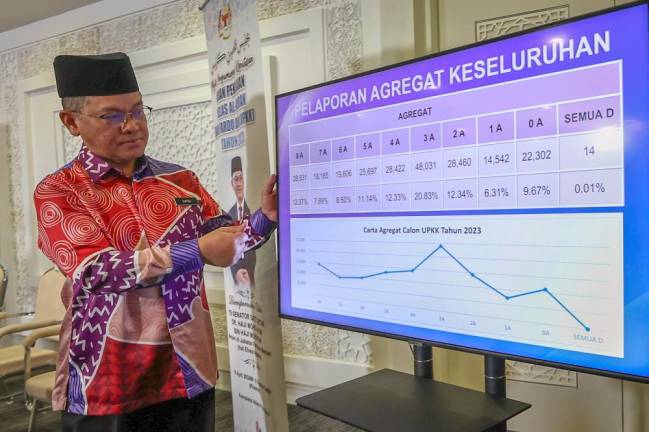The urgency for an assembly of the country’s sharpest thinkers and most respected figures – especially from the younger generation – to reshape national policies and galvanise the necessary reforms has never been more important or necessary.
During the last few weeks one of the most hotly discussed subjects in my WhatsApp chat groups has been the possibility of convening a national consultative council (NCC) to help the nation find its way through the jungle of challenges that we are lost in.
At the same time a number of zoom meetings have focused on topics such as recalibrating the nation, setting up a new roadmap, establishing a new Malaysia vision, and other similar concerns that would most likely appear on the NCC’s agenda should this proposal be taken up by the government.
Many commentators in the less inhibited social media see this time now as one of the most dangerous periods in our nation’s history.
With multiple crises assailing all segments of our society, including the elite, on an alarming range of fronts, the urgency for an assembly of the country’s sharpest minds and most respected figures – especially from the younger generation – to reshape our political and socio-economic policies and galvanise the necessary reforms has never been more important or necessary.
NECC establishment
This initiative should take up from where the nation’s first national economic consultative council left off.
In December 1988 a National Economic Consultative Council (NECC or Majlis Perundingan Ekonomi Negara) was established to formulate a post-1990 economic policy to supersede the New Economic Policy (NEP) whose 20-year life span was ending.
Comprising 150 members drawn from the nation’s political, business, academic and civil society sectors, this multi-ethnic and regionally representative group deliberated for over two years before reaching an agreement on its report, which was handed over to the government in February 1991.
The landmark report referred to as the Economic Policy for National Development (Dasar Economic Untuk Pembangunan Negara, or DEPAN), was officially released in February 1991, a few months before the Sixth Malaysia Plan.
This enabled some of the major recommendations to be reflected in the plan. One key recommendation was for the omission of the numerical target of 30% of equity post 1990, which had been a cornerstone of the NEP policy.
Since the NECC report was not made public it did not have a sustained impact on policy making and on the larger community of policy makers, the public and private sector and academia.
However, its novel approach and out-of-the-box recommendations on how to move Malaysia into a post-NEP era in the economic as well as crucial non-economic and governance sectors make the report a must read and reference point for potential members of any national council set up to reset the nation’s direction of development.
NECC’s unfinished business
Key in the 444-page report and still important today were recommendations on how to ensure economic fairness and justice among the different communities without compromising on existing rights and the objective of a non-racially differentiated and more integrated economy and society.
Instead of focusing on restructuring and redistribution through contentious instruments such as fixed ethnic numerical targets, the NECC report recommended that the new policy should concentrate on growth-oriented policies to create wealth sustainability.
These approaches signified a major departure from NEP-derived practices in which the focus was on manipulation of the NEP and distribution of political rewards with a major outcome being a patchwork of special privileges and rewards, as well as clusters of vested interests, both inside and outside the government.
This inherent weakness with its racial slant and emphasis has continued to be the Achilles heel of socio-economic policy making and implementation in Malaysia.
The report contained not only agreement on a liberal and moderate position on issues of imbalances.
It also provided non-partisan recommendations on employment restructuring, enhancing public sector performance, alleviating poverty, upgrading human resources, redressing imbalances in both public and private sector employment, targeting the most vulnerable and marginalised communities, and other issues regarded as key to the economic future of the country.
These issues continue to be important today and need to be deliberated upon.
The most path-breaking of the NECC recommendations related to the establishment of an independent and non-partisan commission to monitor the implementation of the new policy.
As proposed by the NECC, the Suruhanjaya was to consist of between 15 and 50 eminent persons representing the country’s multi-ethnic people and regions. Appointed by the Yang di-Pertuan Agong and acting like a Royal Commission, it was to be established within six months of the implementation of the new economic policy of DEPAN and would continue to work until the next national economic policy was drafted.
Described by one participant as “a new paradigm for Malaysian national development in the post-1990 period”, the recommendation could have provided the country with a non-political high level body to ensure greater accountability in the way government policies were being implemented.
It would act as a check on unfettered executive power and deviations of policies in key areas of the nation’s life.
Such a body would also help undertake the critical balancing required to reconcile the different interests of the various communities.
In doing so, the body could have provided the crucial missing element required to progress to the objective of national unity – an objective agreed to by members as fundamental to the stable development of the country.
Today a new NCC will not only have the unfinished business of the first NECC to deliberate upon. The list of national challenges has grown.
How to mitigate the disruptive socio-economic impact of the pandemic?
How to bring about the realisation of MA63 to ensure national solidarity and cohesion?
How to ensure the balance between state and religion that is consonant with a secular state?
These and other reform issues neglected or abandoned since the first national consultative meeting require the best and most committed minds of the nation to address and resolve.
Lim Teck Ghee’s Another Take is aimed at demystifying social orthodoxy. Comments: letters@thesundaily.com














